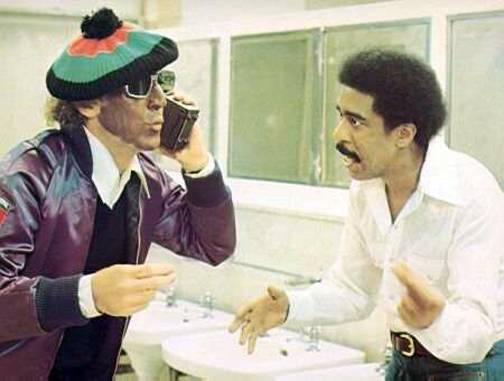“What happened was, I was reading about Buster Keaton,” Gene Wilder said. “About how he did all his own stunts. Like the time he had to stand in exactly the right place for the two-ton building to fall on him and he was right where the window was. So then we were making ‘Silver Streak’ and there we were doing our own stunts.”
That was really you hanging out of the runaway train?
“That was really him,” said Richard Pryor. “That was really him hanging out and me hanging onto his belt. And that was really a train going 50 miles an hour.” “The . . . ah, the poles, for example . . . ” said Wilder, calling the experience back to mind, “the telephone poles went past a lot faster at 50 miles an hour than they did at 10 miles an hour.”
“We rehearsed it at 10 and shot it at 50,” said Pryor. “I was in the doorway, hanging onto Gene’s belt, while he’s leaning out of the train trying to get the coupling unfastened, and I’m thinking, ‘One slip of my foot and good-by, Gene.'”
“What gave me a lot of confidence,” Wilder said, “was that Richie promised me that if I went, he went, too. If I fell off the train and was killed he would throw himself after me.”
“Of course,” said Pryor, “they had me wired to the train.”
“Ha!” said Wilder. “Your foot slips and I fall to my death and your parting words are, ‘Uh, sorry about the wires, man . . .'”
They were talking about one of the most exciting moments in “Silver Streak,” an adventure comedy that takes place on a train between Los Angeles and Union Station. And when I say Union Station, I mean Union Station, because the train doesn’t stop until it’s plowed right through the station.
The movie stars Wilder as a meek book publisher who stumbles onto a murder plot, and Pryor as an escaped thief who teams up with Wilder to foil the plot and save the girl. In one scene, as police detectives search for Wilder, Pryor disguises Wilder as a black, using shoe polish and a hat.
“We were worried about that scene, that it might hurt people’s feelings,” Wilder said, during a visit he and Pryor made to Chicago to talk about the movie. “The way it was written, after I disguise myself, a white man is fooled by my disguise. That was bad because then we’d be saying blacks were like that. And so
Richie came up with a brilliant structural change, and now the scene gets one of the biggest laughs in the movie.”
“Instead of a white dude being fooled by the disguise,” Pryor said, “a black dude comes in and isn’t fooled. Here’s Gene snapping his fingers and holding his portable radio to his ear, and the black dude takes one look and says, ‘I don’t know what you think you’re doing, man, but you got to get the beat.'”
Pryor and Wilder make a good team, Wilder with what he calls his “low-key high energy,” Pryor with his apparent ability to con anybody out of anything.
They’ve both developed in the last several years into major screen comedians, although Wilder has had better roles (from “The Producers” (1968) to “Young Frankenstein” to “Sherlock Holmes’ Younger Brother”) than Pryor — who has often been the best thing in otherwise forgettable films. But now Pryor’s career also seems to be taking off.
“What are you doing next?” Wilder asked him.
“It’s a movie called ‘Which Way is Up?'” Pryor said. “This, uh, Italian director, Lina Wertmuller . . .”
“No!” said Wilder. “Oh, my God! I’ll kill myself!”
“What you moaning about, man?”
“You’re going to work with Lina Wertmuller? She passed right by me and saw you and said ‘I must have that young man’?”
“You didn’t let me finish,” Pryor said. “She made this movie called ‘The Seduction of Mimi,’ and this will be a remake, set among the grape pickers of California. Somebody else is directing.”
“I would have killed myself out of envy,” Wilder said.
“And then,” said Pryor, “I’m in a remake of ‘Arsenic and Old Lace’.”
“My favorite play next to ‘Hamlet’,” Wilder said. “All black cast, I suppose, nothing for me.”
“And then,” said Pryor, “I’m doing ‘Hamlet’.”












